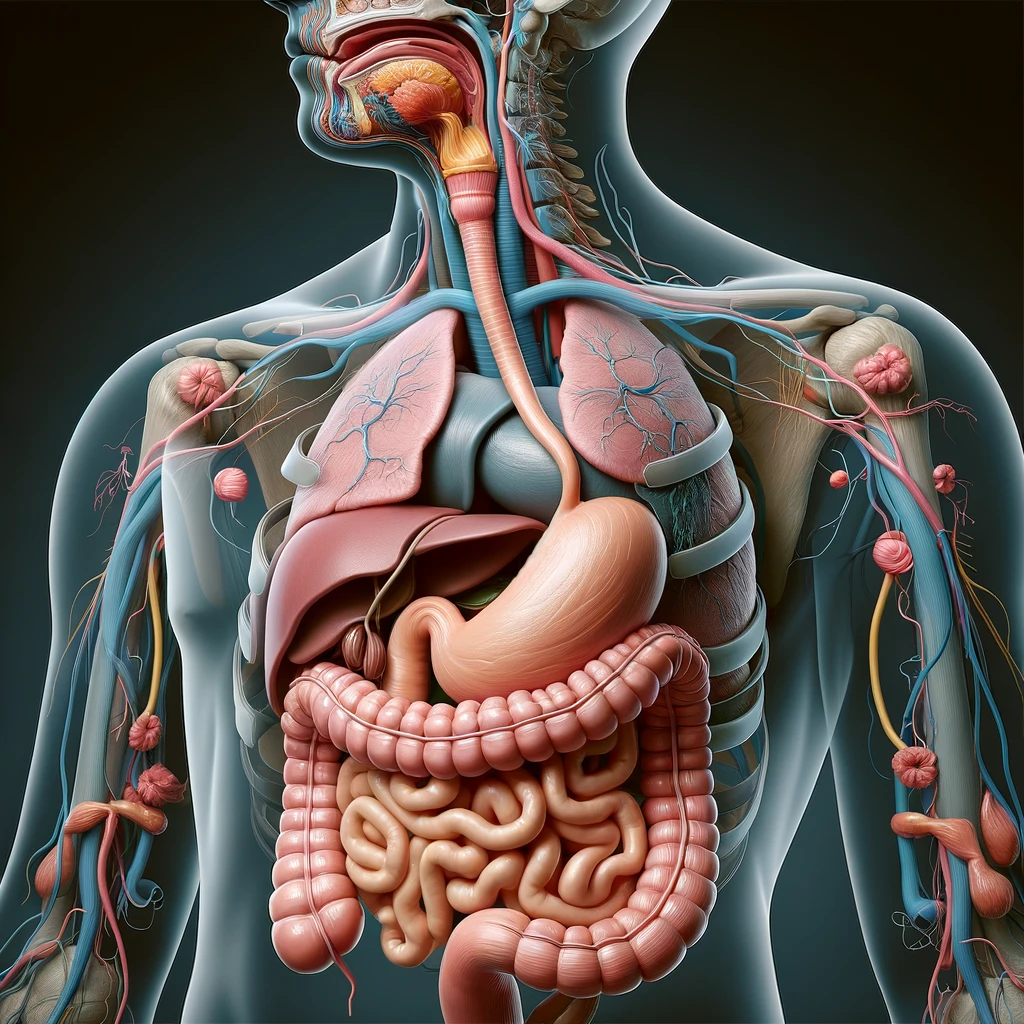We fart because of the gas that builds up in our digestive system. This gas can come from several sources, such as swallowing air when we eat or drink, gases released during the digestion of food, and gas produced by the bacteria that live in our intestines. When this gas accumulates, our body needs to get rid of it, and one way to do this is through farting. Let’s break down this natural process in simple terms to understand why it happens and how.

The Journey of Food and Gas
The journey of food and gas through our digestive system is a fascinating process that begins the moment we take our first bite. As food enters the mouth, it’s mixed with saliva, which contains enzymes that start breaking down carbohydrates. The act of chewing increases the surface area of the food, making it easier for these enzymes to do their work. Once swallowed, the food travels down the esophagus and into the stomach, where it’s further broken down by stomach acids and enzymes, turning it into a semi-liquid substance called chyme.
As chyme moves from the stomach into the small intestine, it mixes with digestive juices from the pancreas, liver, and intestine itself. This is where most of the nutrients are absorbed into the bloodstream. However, not all substances can be easily absorbed here. Some types of fiber, for example, resist digestion and pass into the large intestine largely unchanged.
It’s in the large intestine that the journey of gas production really begins. Here, the undigested food becomes a feast for the trillions of bacteria that inhabit our gut microbiome. These bacteria break down the food, producing gases such as hydrogen, methane, and carbon dioxide as byproducts. While some of this gas is absorbed into the bloodstream and eventually exhaled through the lungs, the rest accumulates in the intestines. This accumulation of gas stretches the walls of the intestines, which can cause the discomfort and bloating often associated with gas buildup. Eventually, when the pressure reaches a certain threshold, the body finds relief through farting, expelling the gas and reducing discomfort.
This process highlights not only the complexity of our digestive system but also the crucial role that gut bacteria play in our overall health. By breaking down food that our bodies can’t digest on their own, these bacteria help us extract more energy and nutrients from what we eat, contributing to our nutritional well-being. However, the byproduct of this beneficial activity is gas, a natural and unavoidable part of digestion that, despite its potential for embarrassment, signifies a healthy, functioning digestive system.
The Role of Digestion
Digestion plays a pivotal role in our body’s ability to sustain itself. It’s a complex process where food is broken down into nutrients that our body can absorb and use for energy, growth, and cell repair. During this process, not only are vital nutrients extracted, but waste products and gases are also produced. The digestive system efficiently manages these byproducts, expelling them in ways that maintain our health and comfort.
The transformation of food into energy and the inevitable production of gas is a testament to the body’s remarkable efficiency. Every bite we take embarks on a journey through the digestive tract, where it’s converted into the fuel that powers every action we make, from thinking to running. However, this conversion process is not without its side effects, as the breakdown of certain foods, especially those high in fiber, results in the production of gas. This gas is a natural outcome of the digestion of complex carbohydrates found in beans, lentils, whole grains, and vegetables, which are not fully broken down in the stomach and small intestine and thus, ferment in the large intestine.
While the process of digestion and gas production might seem mundane, it’s a critical aspect of our biological functions, highlighting the delicate balance between nourishment and the body’s waste management systems. The abstract illustration captures this essence, using vibrant colors to symbolize the energy derived from food and softer, swirling patterns to depict the formation of gas, offering a metaphorical glimpse into the dynamic process of digestion.
Bacteria’s Part in Farting
Our intestines are home to a vast number of bacteria, which help in digesting food that our stomach and small intestine haven’t fully broken down. When these bacteria feast on the undigested food, they produce gas as a byproduct. This gas builds up and eventually, our body has to release it.
The Escape
The gas in our digestive system builds pressure. When the pressure gets high enough, the body expels the gas through the rectum, which we know as farting. The sound and smell of a fart depend on several factors, including how much gas is being released, the speed at which it’s expelled, and the composition of the gas, which can be influenced by what we’ve eaten.
Why Farts Smell
The reason farts smell has much to do with the composition of the gas that is released during the process of digestion. While a significant portion of fart gas is composed of odorless gases, including nitrogen, carbon dioxide, oxygen, and methane, the characteristic smell of farts comes from small amounts of other gases that contain sulfur.
Sulfur-containing gases such as hydrogen sulfide, methanethiol, and dimethyl sulfide are the primary culprits behind the unpleasant smell of farts. These gases are produced when bacteria in the large intestine break down certain types of food, particularly those rich in sulfur. Foods known for their high sulfur content include eggs, meat, cheese, onions, garlic, and cruciferous vegetables such as broccoli, Brussels sprouts, and cabbage.
The human digestive system cannot completely break down some complex carbohydrates, proteins, and fiber found in our diet. When these undigested food particles reach the large intestine, they become food for the billions of bacteria that reside there. As these bacteria digest or ferment the food particles, they produce various gases as by-products. The mix and quantity of gases depend largely on the types of bacteria present in the intestine and the specific foods being broken down. This process is entirely natural and plays a crucial role in the digestive system.
The smell of a person’s farts can vary significantly based on their diet and the unique composition of their gut microbiome, which is the community of microorganisms living in the digestive tract. Some people may produce smellier farts due to the presence of specific bacteria that produce more sulfur-containing gases. Additionally, changes in diet can lead to temporary changes in the odor of farts. Consuming large amounts of sulfur-rich foods can increase the production of sulfur-containing gases, leading to smellier farts.
Health and Smelly Farts
While smelly farts are usually a normal part of digestion, excessively foul-smelling farts can sometimes be a sign of a digestive issue, such as lactose intolerance, celiac disease, or an infection. These conditions can alter the digestive process or the composition of the gut microbiome, leading to increased production of sulfur-containing gases.
The Importance of Farting
While it might be embarrassing, farting is a normal and essential part of the digestive process. It helps relieve discomfort from the buildup of gas in the intestines. In fact, not farting when needed can lead to bloating and discomfort.
In Summary
Farting is a natural, healthy bodily function that occurs when there’s a buildup of gas in the digestive system that needs to be released. Whether it’s the air we swallow, the gas from digesting food, or the byproducts of intestinal bacteria, our body has a built-in mechanism to help us stay comfortable and gas-free. Understanding this process can help reduce the stigma around farting and remind us that everyone does it. It’s a sign that our digestive system is working as it should, breaking down food to nourish our bodies and expelling what we don’t need.

